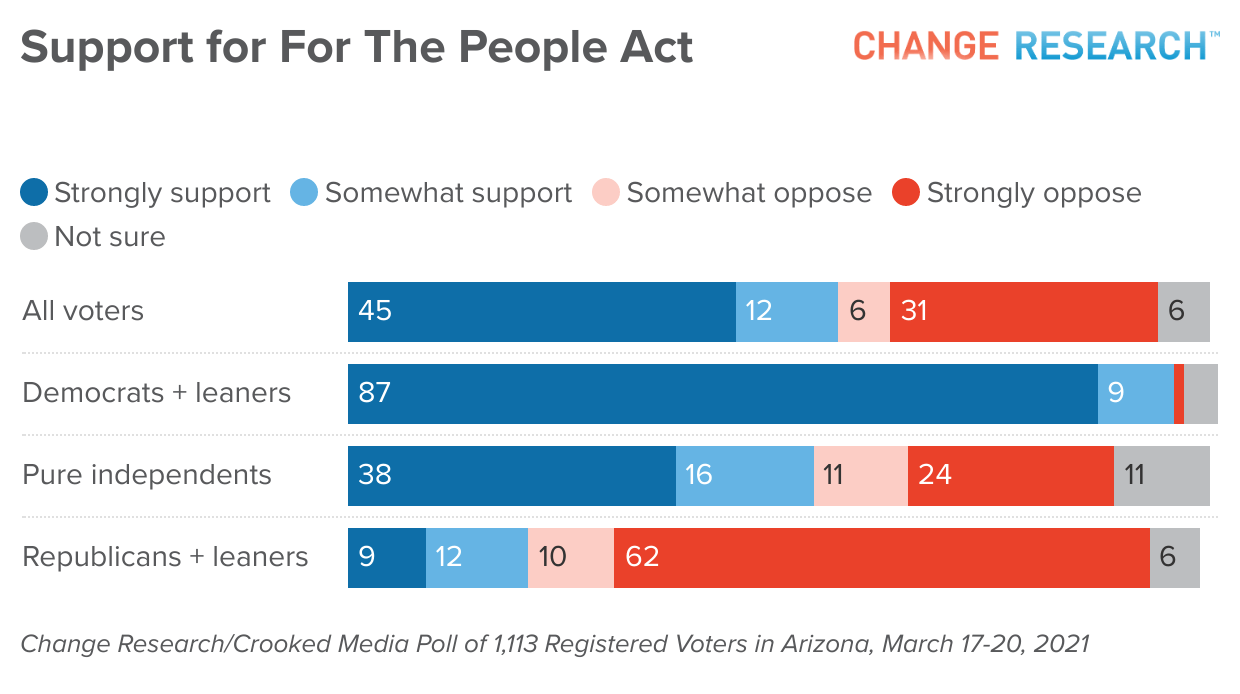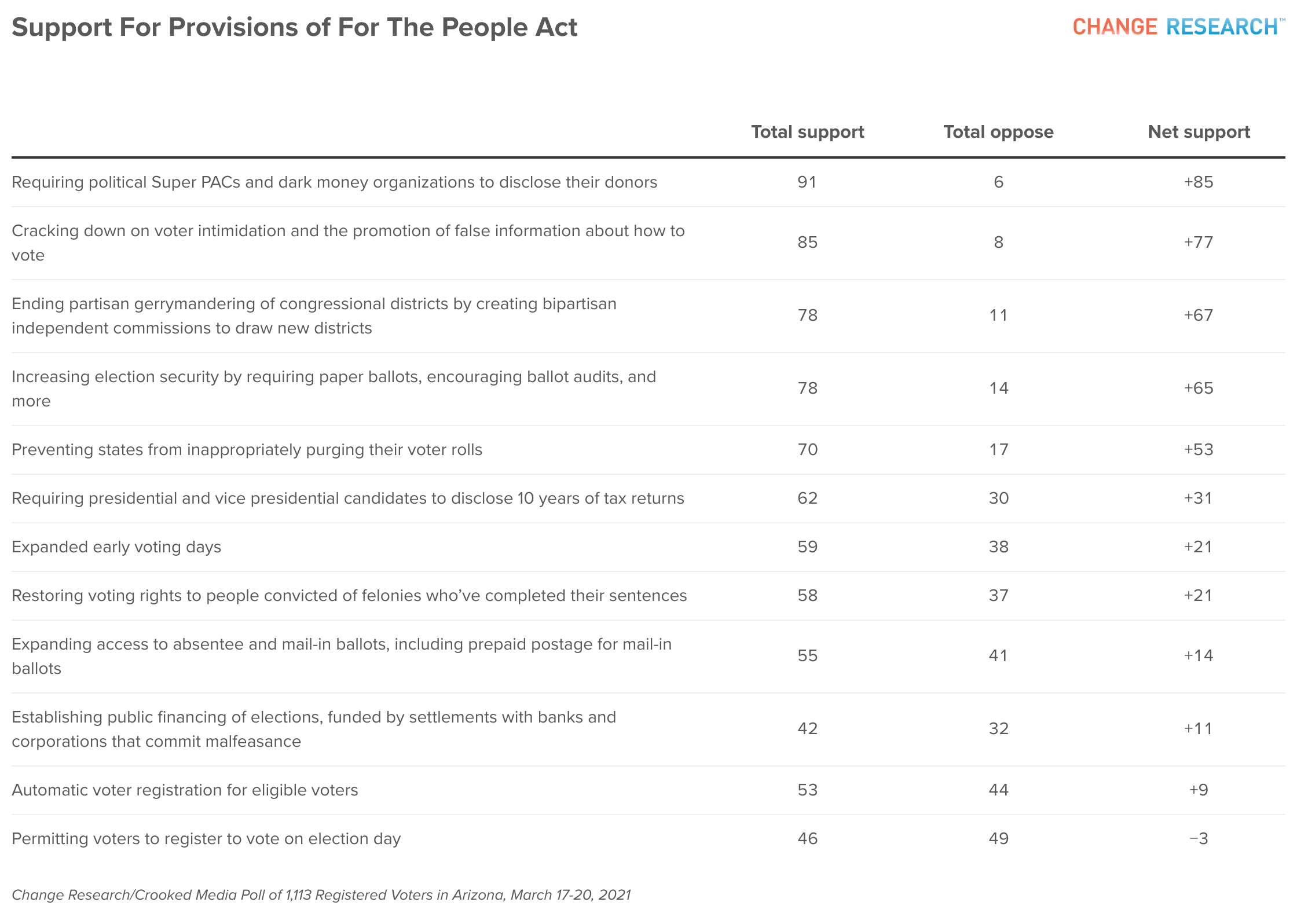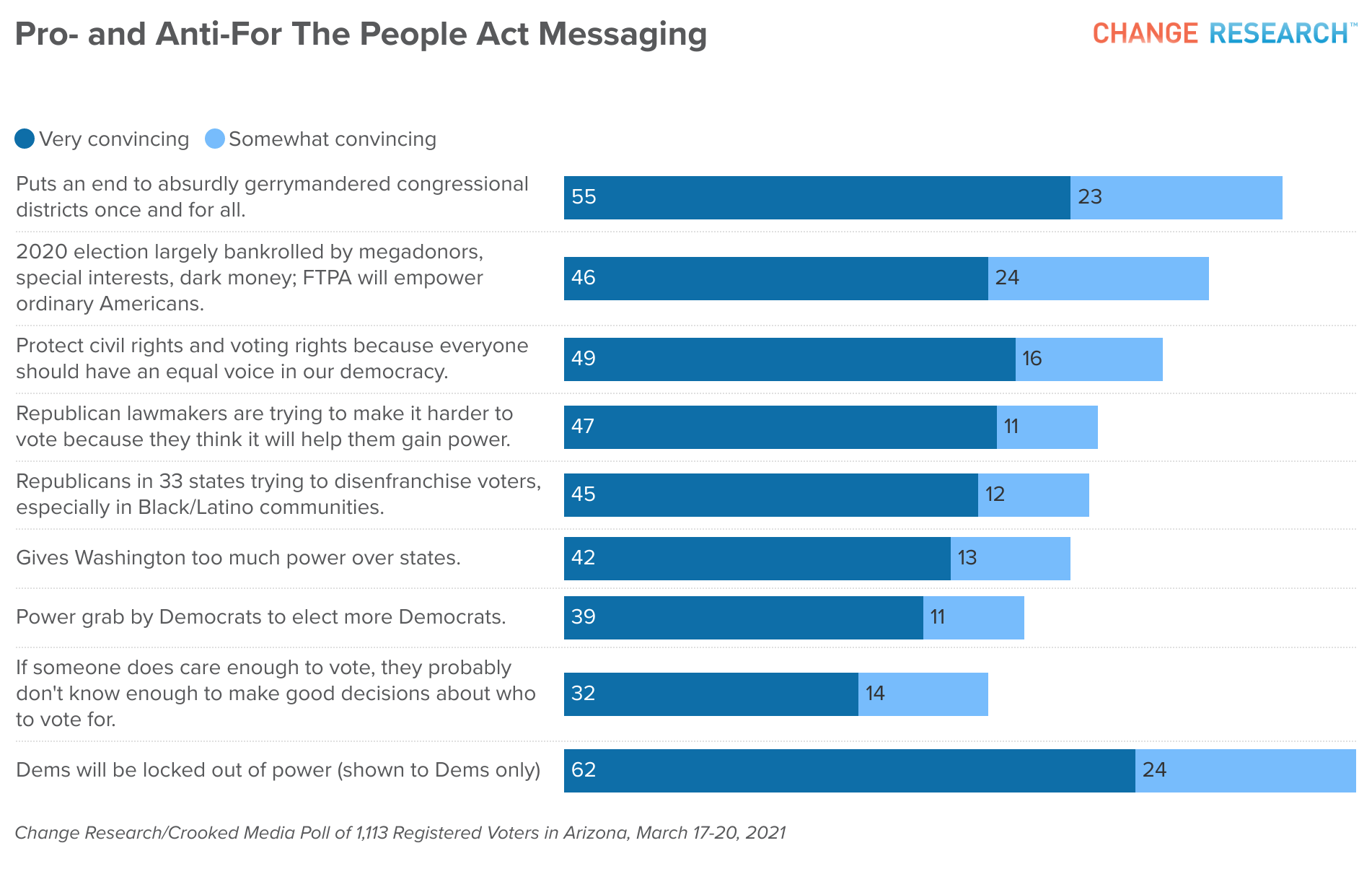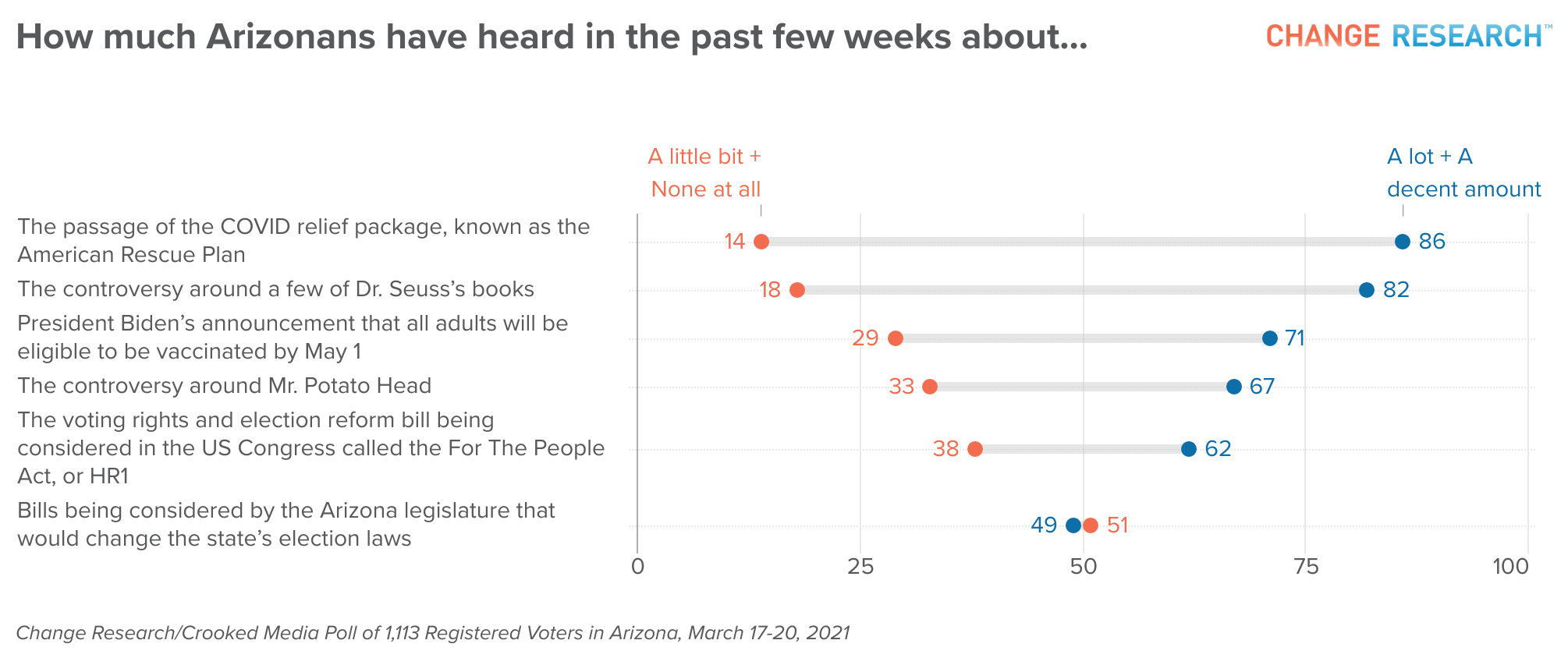Crooked Media/Change Research Poll of 1,113 Registered Voters in Arizona: March 17-20, 2021
KEY INSIGHTS
- Overall, the For The People Act is popular – although support drops when voters become aware it’s a Democratic bill. The bill starts out with 57% of Arizonans supporting, 38% opposing. After voters are confronted with messaging questions and some more detailed information about the bill’s provisions, support falls to 50% and opposition rises to 43%. This is almost entirely due to partisan sorting — people turn against the bill not because of what’s in it, but because they realize it’s a Democratic bill.
- Arizonans strongly dislike the specific changes in Republican state legislators’ bills — but most don’t know about them. Every provision of Republican state legislators’ bills that we asked about, with the exception of voter ID requirements, is opposed by at least 60% of voters. But most voters have heard little or nothing about the bills — significantly less than they have heard about HR1, and far less than they have heard about Dr. Seuss or Mr. Potato Head.
- Some of the most pro-democracy elements of HR1 are some of the most popular. Voters of all political affiliations hate gerrymandering, dark money in politics, and disinformation about elections; they love election security and ensuring that everyone has an equal voice in our democracy. But just as importantly, they love nods to bipartisanship, like the “independent bipartisan commissions” that will redraw districts, and doing away with “liberal and conservative billionaires’ dark money.” On the flip side, arguing that Democrats could be shut out of power if the bill is not passed is ineffective among Democratic voters, and alienates everyone else.
- Arizona is still as purple as states come. Biden’s approval rating is at -3 (47% approve, 50% disapprove). His favorability (44% favorable, 51% unfavorable) is slightly worse than Trump’s (45% / 48%). And Mark Kelly’s are at 41% / 45%. Every serious GOP contender for Senate in 2022’s favorability is also deeply underwater.
FOR THE PEOPLE ACT
Democrats in Arizona don’t need to be convinced to care about voting rights. “Voting rights and strengthening our democracy” is the top issue for 18% of Biden voters — behind only COVID-19, but well ahead of healthcare, the environment, civil rights, and education. It’s also more than the 13% of Trump voters who say “voter fraud” is their top issue (that’s also the second-highest-ranking issue among Trump voters; immigration is #1, at 21%).
And Democrats recognize the importance of passing the For The People Act. 79% of Biden voters say it’s “very important” to pass the bill, and another 14% say it’s somewhat important. Only 2% of Biden voters say it’s not important.
The bill is popular. Initially, 57% support the For The People Act and 38% oppose it. People feel strongly on either end: 45% strongly support it, while 31% strongly oppose it. It has significant bipartisan support: 22% of Republicans and Republican-leaning independents support it, along with 96% of Democrats and Democratic-leaning independents. And independents who lean toward neither party support it by a 54-35 margin.

The bill gets less popular after messaging — not because of what’s in it, but because Democrats are the ones trying to pass it. After messaging questions and a rundown of what’s in the bill, support falls to 50%, while opposition rises to 43%. The drop is almost entirely a result of partisan sorting: those who either stop supporting the bill over the course of the survey or start opposing it voted for Trump by an 84% to 11% margin.
The bill’s provisions are popular — some overwhelmingly.
- There is overwhelming bipartisan support for the measures on election security, transparency, ending dark money, and gerrymandering.
- Of the measures relating to voting rights, by far the most popular measure is ending the inappropriate purging of voter rolls.
- Support for most other voting rights provisions is in the 50s. The one exception: same-day registration, which is at 46-49. This and voter-roll purging are also the only pro-voting measures on which pure independents are not slightly to the left of the electorate.

By far the most effective message about the bill was on gerrymandering: its 55% “very convincing” number was 6 points higher than any other message. The “dark money” message was at least somewhat convincing to 70% — the second-highest of any message. But the message on protecting “civil rights and voting rights because everyone should have an equal voice in our democracy” did have the second-highest “very convincing” numbers, at 49%.
- One important note: the top two messages both highlighted the bipartisan nature of the bill. The gerrymandering message mentioned the independent, bipartisan commissions that would draw districts, while the dark money bill mentioned ending “liberal and conservative billionaire dark money in politics.”
- Of the three anti-HR1 messages we tested, “power grab by Democrats” and “gives Washington too much power over states” were about equally effective, but neither performed nearly as well as the arguments in favor of the bill.

60+ percent oppose nearly all of the measures Arizona Republicans are taking to make voting harder. Requiring voters to show proof of citizenship is the only popular measure being pursued by Arizona Republicans: 62% support it, while 35% oppose it. Every other measure we asked about is opposed by at least 60% of voters, and supported by at most 38%. And after we describe some of the measures Arizona Republicans are attempting to pass, 41% of respondents say Republicans are trying to make it harder for them to vote, while just 7% say easier (43% say no difference).
But most people haven’t heard much about the bills Arizona Republicans are pursuing. Just 49% have heard a decent amount or a lot about these bills in the past few weeks. That’s less than the 62% who’ve heard about HR1, the 86% who’ve heard about the American Rescue Plan — and the 82% who’ve heard about Dr. Seuss, and 67% Mr. Potato Head.

THE FILIBUSTER
Voters are evenly split on an up-or-down question about the filibuster. 45% of voters support ending the filibuster, while 46% are opposed. It’s not perfectly polarized: 18% of Republicans and Republican-leaning independents want to end it, while 13% of Democrats want to maintain it. In a differently framed question, 48% said the filibuster should be retained to ensure the minority party has a say, while 41% said it should be reformed or abolished to ensure that the majority isn’t blocked from passing laws to help the American people.
Depending on framing, support for ending or reforming the filibuster shifts. In the event that HR1 is filibustered, 46% support ending it, while 42% oppose it. But among the half of respondents who were asked not about ending it, but about reforming the filibuster to exempt it from democracy reforms, 40% support these reforms, while 46% are opposed. Both Democrats and Republicans are more supportive of ending the filibuster entirely than creating a carve-out for democracy reforms; independents who lean toward neither party slightly prefer the carve-out. Bottom line: elected officials should not assume that they are going to win more votes in the next election because they reform the filibuster instead of ending it.
Voting to eliminate or reform the filibuster is unlikely to be a game-changer for Senator Kyrsten Sinema’s political future. We asked Arizonans how their votes would change if Sinema voted to reform the filibuster in order to pass HR1. It appears that it would give her a slight boost in the Democratic primary, while it would be slightly damaging to her in the general election. 43% of Democrats and Democratic-leaning independents would be more likely to vote for Sinema in her next primary, while 28% would be more likely to vote for her opponent. Meanwhile, 44% of all voters would be less likely to vote for her in the next general election (39% “much” less likely), while 32% would be more likely. Only 40% of Democrats + Democratic-leaning independents view Sinema favorably, and only 27% of all voters do, so she really can’t afford to take either election for granted. (That said: many of her potential Republican challengers are deep underwater — the only Arizona Republican viewed favorably by more than 25% of voters is Cindy McCain, who’s only that high because 50% of Democrats view her favorably. Just 5% of Republicans do.)
CANCEL CULTURE & MINIMUM WAGE
Voters in Arizona are very concerned about what’s happening to Dr. Seuss. 48% of respondents say that the Dr. Seuss controversy is a perfect example of liberal cancel culture run amok, while 42% say it’s a fake controversy invented by conservatives to distract from Biden’s successful passage of the American Rescue Plan. People’s choices are strongly correlated with party ID — but 13% of Biden voters are not sure, which is why “cancel culture” has the edge.
Nearly three in four voters support raising the minimum wage, and 44% support raising it to $15. We phrased this very conservatively — offering a reasonable- and centrist-sounding “raising the minimum wage, but not to $15” option between the two poles. Still, a large plurality, 44%, chose raising the wage to $15 — including not only 80% of Biden voters, but 10% of Trump voters as well. The majority of Trump voters do support raising the minimum wage, as do 96% of Biden voters.
